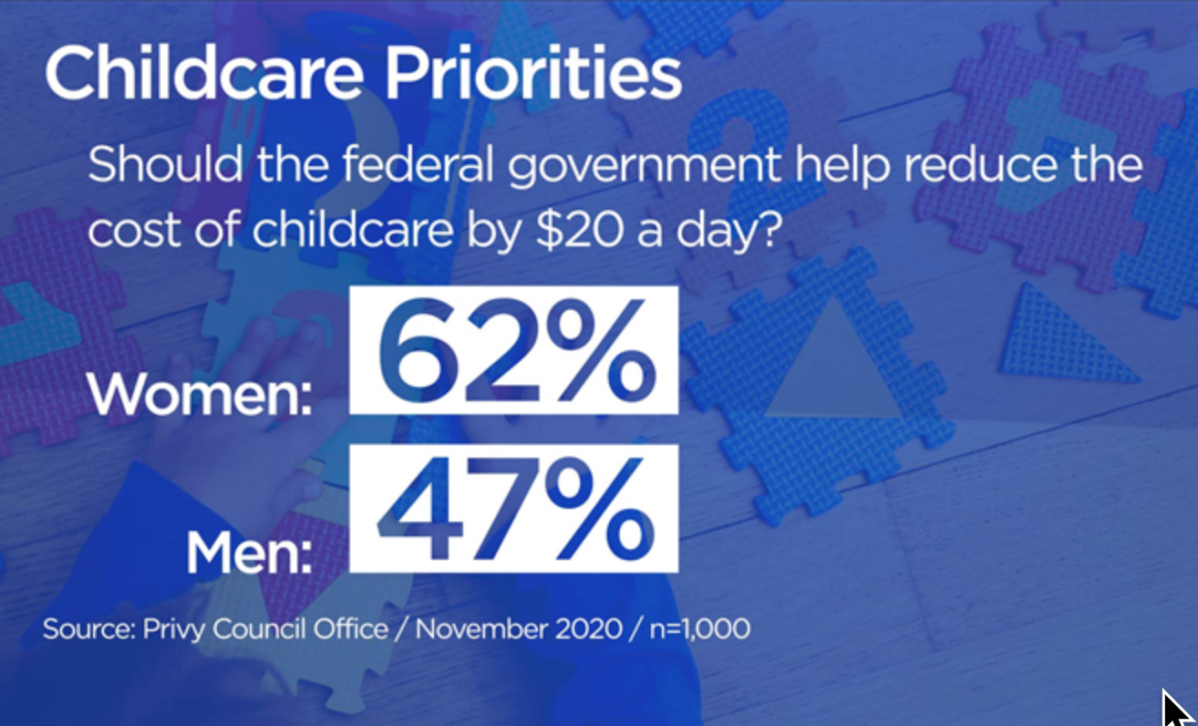The federal government is considering new measures to improve access to child care in this spring’s federal budget — measures which could include a generous tax credit or direct cash subsidies to parents, Global News has learned.

In the same week that Deputy Prime Minister and Finance Minister Chrystia Freeland was delivering the Fall Economic Statement last November, the Privy Council Office had put a poll into the field asking thousands of Canadians detailed questions about their child-care situation — and about potential federal government policies to help with child care.
As part of the poll, a copy of which was obtained by Global News using access-to-information laws, the PCO had its pollster provide survey respondents with multiple-choice options for top priorities for the federal government. One was the provision of a tax credit worth $5,000 per child; another was a subsidy of $20 per day, per child.
The cash subsidy was particularly popular among female respondents with 62 per cent of women preferring that as Ottawa’s top priority for child care versus 47 per cent of male respondents. The idea of a tax credit was a preferred option by about 52 per cent of respondents, spread equally between men and women.
Experts, though, are cautious that a federal tax credit would do much to help.
- Iran fires air defences at military base after suspected Israeli drone attack
- U.S. aid to Ukraine, Israel set to pass. But bills differ in one key area
- Carbon rebate labelling in bank deposits fuelling confusion, minister says
- Conservatives ask interference inquiry judge to rule elections were flawed
“I think it is the path of least resistance, because it means they don’t have to get involved in the quality or the standards of care, but it does not create one more new space that is high quality,” said Armine Yalnizyan, an economist who is the current Atkinson Fellow on the Future of Workers.
The PCO poll did ask respondents to list their barriers to child care and the high cost of child care topped the list, cited by 59 per cent of respondents. But waiting lists, the availability of spaces, and quality of available child care were the next most common factors cited by respondents at 47 per cent, 45 per cent, and 26 per cent respectively.
Those last three factors speak less to problems of affordability and more to problems with capacity.
But when it comes to building and funding more child-care spaces, the federal government runs straight into an area of clear provincial jurisdiction.
“The federal government can do nothing without provincial dance partners. That’s where the rubber hits the road,” said Yalnizyan.
Early on in the pandemic, Yalnizyan coined the term “she-cession” to refer to the fact that job losses and income losses were disproportionately accruing to women.

“I’ve been saying this for months — there is no recovery without a she-covery and no she-covery without child care.
“It’s mathematically impossible to get to recovery without making sure women have a safe place to leave their kids.”
That phenomenon of a ’she-cession’ was clearly on Freeland’s mind as she delivered her Fall Economic Statement on Nov. 30.
“We know that COVID-19 is rolling back many of the gains Canadian women have fought for and won in my lifetime,” Freeland told the House of Commons then.
“I say this both as a working mother and as a finance minister. Canada will not be truly competitive until all Canadian women have access to the affordable child care we need to support our participation in our country’s workforce.”
Freeland’s office would not comment on any specific measures that might be in the budget, such as tax credits or subsidies for child care, but her office did highlight Freeland’s speech on Nov. 30 as she delivered the fall fiscal update.
One of the more alarming data points in the PCO poll was the number of families who, as late as December, had not been able to return their children to the child-care program they were in before the pandemic. Nearly one in three — or 29 per cent — of respondents with children said they had not been able to return their children to a child-care program.
Yalnizyan said the federal government should aim at improving the quality and supply of child care, a difficult task that would involve Ottawa co-operating closely with the provinces. Child care providers, she said, need more access to training, compensation levels need to be adjusted, and resources need to be provided to increase staffing and reduce class sizes.
“It’s completely achievable by building on the successes we already have and not giving money to just simply expanding the market, but rather to building a system of high-quality child care,” Yalnizyan said. “There’s one policy amendable pathway and that’s removing the chokepoint of the unavailability of child care.”
The internal polling was done by the PCO’s pollster-of-record, Elemental Data Collection Inc. of Ottawa, which holds a one-year contract worth $1.5 million to do the weekly polling on behalf of the PCO.
The PCO is responsible for choosing the questions in each poll. The questions on child care were included in polls done in the last two weeks of November and the first two weeks of December.
The raw polling data obtained by Global News does not provide detailed information about the pollster’s methodology, but it is clear from the documents provided that the poll sample size was 1,000 people and that the pollster screened for the kind of demographic data — language, region, gender, age and so on — that allowed the pollster to weight the results to mirror the actual makeup of the Canadian population.
For its work for the PCO, Elemental uses live-agent telephone polling.





Comments